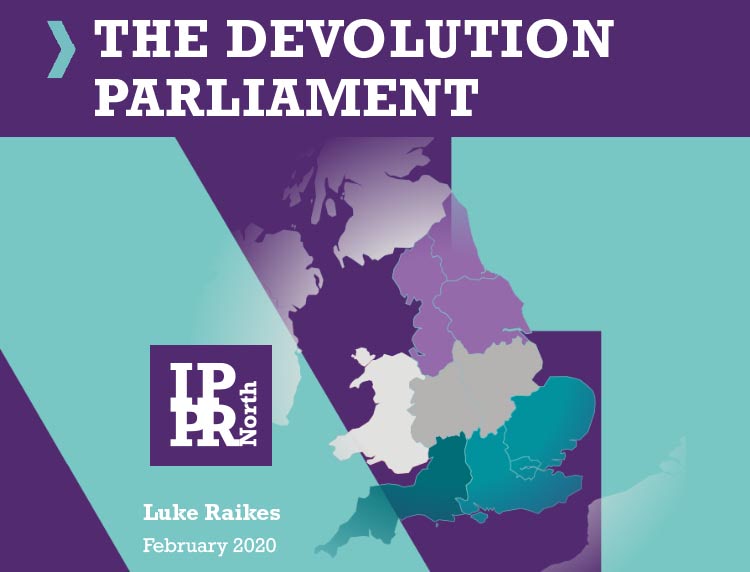Half of new jobs in England in the last decade were in London

The Devolution Parliament: Devolving power to England’s regions, towns and cities
A new report released today (21 Feb) by IPPR showed that almost half of new jobs in England in the last decade were in London and the south-east, despite only a third of the population living in that region.
For decades, Westminster government has enabled deep divisions to grow in this country:
- Divisions between whole regions of England;
- Divisions between cities, towns and villages; and
- Divisions within places, between people.
London and the South East – home to just one-third of the England’s population – has accounted for almost half (47 per cent) of the country’s increase in jobs in the last decade.
The UK is the most regionally unequal country in the developed world
Inner London is one of the most productive areas in the whole of the EU, while, in other parts of the UK, productivity is similar to Poland, Hungary and Romania.
No other country tolerates the inequalities of power and prosperity that divide England, and most major countries across Europe and the developed world have several centres of prosperity. As a result, they tend to have healthier, more resilient national economies with higher productivity and greater inclusion.
This paper “The Devolution Parliament” lays out a case for change that shows how the country could benefit from the right programme of devolution in England.
 Jason Fowler, VP, HR Director for Fujitsu UK and Ireland, said:
Jason Fowler, VP, HR Director for Fujitsu UK and Ireland, said:
“With the skills gap costing UK business £4.4bn a year, it is worrying to see such a significant regional divide when it comes to the creation of new jobs. It is time that organisations think more strategically about their future and shake up this London-centric thinking. The UK holds enormous potential and unlocking this with more jobs across the country is key to a healthy economic development.
“As we begin a new year and a new decade, social mobility will become a more pressing issue, and I hope to see more organisations change the way they find, recruit and progress talented employees from different social class backgrounds. But this also means tapping into the regional potential when it comes to opening a new office or relocating one. Cities like Bristol and Manchester – where the tech sector has created thousands of jobs – are a perfect example of how businesses can benefit from talent across the UK.
“To sustain the competitiveness of the UK economy, we – private and public organisations – need to ensure that opportunities are being spread out equally across the country. By focusing so heavily on the South East – and putting all their eggs in one basket – means there is a whole pool of talent out there being overlooked. Businesses nationwide need to do more to ensure these opportunities are open to everyone across the country.”
Secretary of State urges colleges to bid for Towns Fund: The Secretary of State, Gavin Williamson has written to colleges this week asking them to engage with the Government’s Towns Fund in their area. To support investment in further education and… https://t.co/9HKgY2FnzT pic.twitter.com/MvW3YiDpLd
— FE News – The #FutureofEducation News Channel (@FENews) February 20, 2020
Top 5 Recommendations
Delivering a ‘devolution parliament’ is crucial and requires bold reforms at all levels of government – from the national, to the regional, subregional and local tiers. To achieve this, the government must act on five priorities.
1. Roll out an inclusive devolution process for all of England
- Set out a coherent plan for a devolution parliament
- Set up a Convention on Devolution in England
- Set up a long-term devolution framework and a joint devolution panel
2. Devolve fiscal powers in phases, in a fair and sensible way
- Reverse austerity and refound fiscal devolution on progressive principles
- Devolve real fiscal powers, with appropriate safeguards, in phases
- Build up and devolve an inclusive growth and resilience fund
3. Develop a locally led regional tier of government
- Devolve powers to regions that complement those of combined authorities
- Develop regional institutions at a scale appropriate for England’s economic geography and the global economy in which it operates
- Develop regional capacity, drawing on existing capacity and from central government
- Regional governance should evolve as powers are taken on
4. Devolve economic powers to city regions and nonmetropolitan areas
- Support subregional reform into more accountable structures, such as combined authorities, and enable more citizen involvement
- Devolve real economic power where appropriate to subregional combined authorities, and other reformed subregional authorities
- Set up a capacity fund to pump prime the capacity of new combined authorities and other reformed subregional authorities
- Rationalise, reform and integrate local enterprise partnerships
5. Permanently reform centrallocal relationships with a new constitution
- Set up a National Economic Council that includes regional representation
- Reform the House of Lords, through a constitutional convention, to ensure regional representation is embedded in national government permanently











Responses